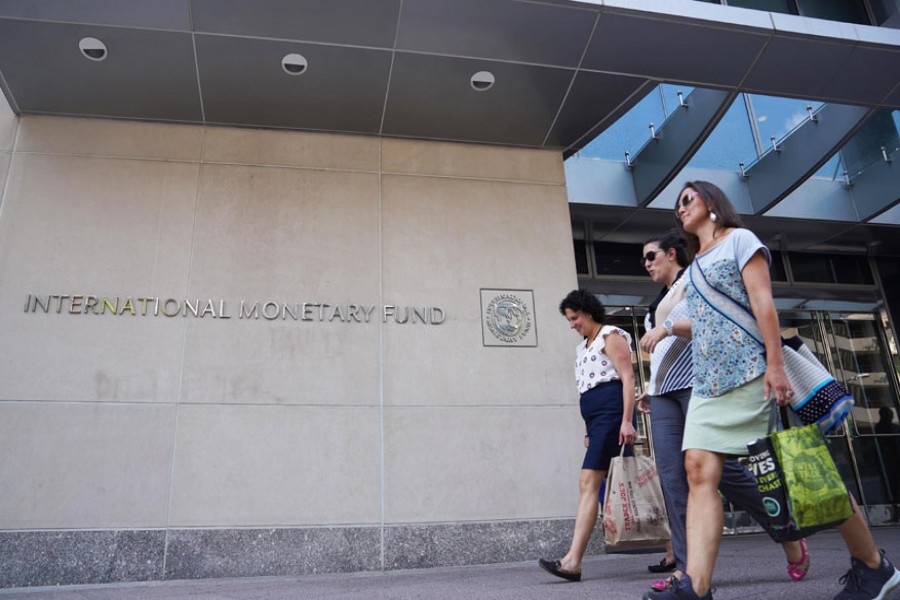The International Monetary Fund (IMF) on Friday affirmed its view that China's exchange rate is broadly in line with economic fundamentals.
Experts said IMF's new report provides further evidence that US designation of China as a "currency manipulator" is groundless and irresponsible.
Broadly in line with economic fundamentals
China's real effective exchange rate (REER) in 2018 is estimated to be at the same level as warranted by fundamentals and desirable policies, the IMF reiterated on Friday in a staff report after concluding the annual Article IV consultation to review the Chinese economy, noting that the average REER in 2018 appreciated by about 1.4 per cent relative to 2017, driven by the appreciation in the nominal effective exchange rate (NEER) (1.5 per cent).
"The external position in 2018 was assessed to be broadly in line with the level consistent with medium-term fundamentals and desirable policies," the IMF said, consistent with its earlier conclusion in its annual External Sector Report released in July.
"The IMF report makes clear that there has been absolutely no currency manipulation and that China's external balance has been appropriate," Jeffrey Sachs, a senior United Nations advisor and renowned economics professor at Columbia University, told Xinhua via email.
In response to the IMF estimates through May 2019 which show the REER has depreciated by about 0.2 per cent relative to the 2018 average, Sachs said the unilateral tariff action by the United States "surely has caused some depreciation" of the equilibrium REER.
"The U.S. Treasury action declaring China a currency manipulator was blatantly arbitrary, capricious and political, based on Trump's tweets rather than on objective analysis," Sachs said, while noting that U.S. trade and financial behavior towards China is "utterly irresponsible."
US assertion unconvincing
The IMF report showed that China's current account surplus fell by around 1.0 percentage point to 0.4 per cent of gross domestic product (GDP) in 2018 and it is projected to remain contained at 0.5 per cent of GDP in 2019.
Noting that China's current account surplus is "small," Mark Sobel, non-resident senior adviser at the Center for Strategic and International Studies (CSIS), and U.S. chairman of the Official Monetary and Financial Institutions Forum, told Xinhua "that estimates suggest China has not been intervening in the foreign exchange market."
"As such, the Article IV clearly rebuffs the recent U.S. assertion that China is 'manipulating' its currency to gain unfair competitive trade advantage or prevent effective balance of payments adjustment," said Sobel.
The IMF report came only a few days after the United States unilaterally labelled China as a "currency manipulator," which prompted criticism from experts worldwide.
Former US Treasury Secretary Lawrence Summers criticised the US administration for naming China a "currency manipulator," saying such a move has damaged the US credibility.
"Without some mercantile advantage, and with ongoing efforts to prop up the exchange rate and so raise export prices and reduce import prices, there is no credible manipulation claim here," Summers argued in an opinion piece published on The Washington Post.
"It will be harder now in the next difficult financial moment for Treasury Department pronouncements to be credited by market participants," said Summers, emphasising that "the move down in the yuan on Monday was not artificial -- it was an entirely natural market response to newly imposed U.S. tariffs."
Scott Kennedy, senior adviser of the Freeman Chair in China Studies and director of Project on Chinese Business and Political Economy at CSIS, said on Twitter that seven is not a "magic number," noting that yuan's fall below seven should not cause competitive devaluations and "isn't proof of manipulation deserving of U.S. retaliation."
There has been economic pressure for yuan depreciation for months, Kennedy said.
China's reforms lauded
In the newly released IMF report, the IMF executive directors also commended the Chinese authorities' recent reform progress, in particular, in reducing financial sector fragilities and continuing opening-up of the economy, while underscoring the importance of structural fiscal reforms that can enhance medium-term growth.
Welcoming the country's commitment to multilateralism and a rules-based trading system, the executive directors agreed that trade tensions between China and the United States should be quickly resolved through a comprehensive agreement that avoids undermining the international system.
The directors also concurred that greater exchange rate flexibility and deeper and better functioning foreign exchange markets would help the financial system prepare for greater capital flow volatility.
China on Tuesday voiced strong opposition to the US decision to label it "a currency manipulator," stressing that China has never resorted to competitive devaluation and will not use currency as a tool for competition.
"The U.S. labeling is an arbitrary unilateral and protectionist practice, which seriously undermines international rules and will significantly impact the global economy and financial markets," the People's Bank of China (PBOC), China's central bank, said in a statement.
These remarks were echoed by Sachs, who said the United States is abusing its role in the international trade and financial system.
"I truly hope that this irresponsible behavior is ended quickly and that the United States adheres to international rules," he told Xinhua.


